
Maurice Ernest Gibb was a British musician, singer, songwriter and record producer who achieved fame as a member of the Bee Gees. Although his elder brother Barry Gibb and fraternal twin brother Robin Gibb were the group's main lead singers, most of their albums included at least one or two songs featuring Maurice's lead vocals, including "Lay It on Me", "Country Woman" and "On Time". The Bee Gees were one of the most successful rock-pop groups of all time.

Sir Barry Alan Crompton Gibb is a British-American musician, singer-songwriter and record producer who rose to worldwide fame as a co-founder of the group the Bee Gees, one of the most commercially successful groups in the history of popular music. With his younger brothers, twins Robin and Maurice Gibb, he formed a songwriting partnership beginning in 1955. He has lived in Britain, Australia, and the United States, holding dual UK–US citizenship.

Cucumber Castle is the seventh studio album by the Bee Gees, released in April 1970. It was produced by Barry Gibb, Maurice Gibb, and Robert Stigwood. It consists of songs from their television special of the same name, which was named after a song on their 1967 album Bee Gees' 1st. Cucumber Castle is the only Bee Gees album not to feature any recorded contributions from Robin Gibb, as he had left the group before the album was recorded.
"I Still Love You" is a song by the Bee Gees primarily written by Barry, Robin & Maurice Gibb. It was released as a double A side of "Living Eyes" and on the album Living Eyes. Produced by the Gibb brothers with Albhy Galuten and Karl Richardson.
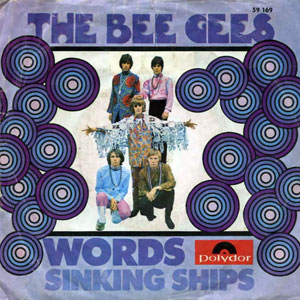
Words is a song by the Bee Gees, written by Barry, Robin & Maurice Gibb. The song reached No. 1 in Germany, Canada, Switzerland, and the Netherlands.
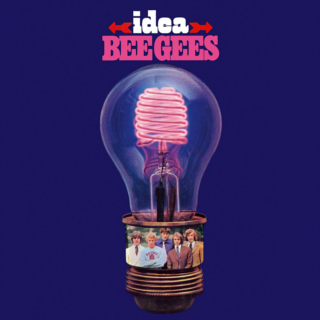
Idea is the fifth album by the Bee Gees. Released in September 1968, the album sold over a million copies worldwide. The album was issued in both mono and stereo pressings in the UK. The artwork on the Polydor release designed by Wolfgang Heilemann featured a "beehive" neon lightbulb with a group photo in its base, while the North American ATCO release designed by Klaus Voormann featured a composite head made from each band member. It was their third internationally released album - the first two albums being released only in the Australian market.
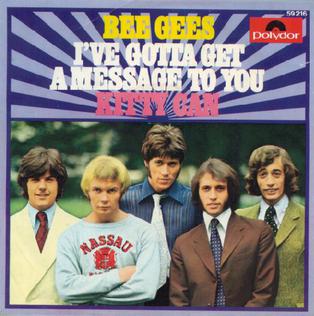
"I've Gotta Get a Message to You" is a song by the Bee Gees. Released as a single on 7 September 1968, it was their second number-one single on the UK Singles Chart and their first US Top 10 hit. Barry Gibb re-recorded the song with Keith Urban for his 2021 album Greenfields.
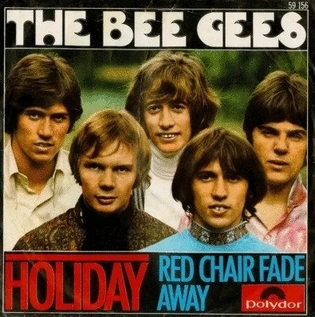
"Holiday" is a song released by the Bee Gees in the United States in September 1967. It appeared on the album Bee Gees' 1st. The song was not released as a single in their native United Kingdom because Polydor UK released the single "World" from their next album Horizontal.

"I.O.I.O." is a song by the Bee Gees, released on the album Cucumber Castle. It was written by Barry and Maurice Gibb. The song was released as a single in March 1970, and was also one of the highlights of the album. The single was a relative success mainly on European charts. Its music video is taken from the film Cucumber Castle.
"Melody Fair" is a song by the Bee Gees, written by Barry, Robin & Maurice Gibb in 1968 and released in 1969 on their album Odessa. It was not released as a single, but this song was played on many radio stations, and was a hit in Japan. Andy Gibb's 1974 group, named Melody Fayre was named after this song. It also featured as the theme to Melody, a British film featuring a number of Bee Gees songs in its soundtrack.
"I Can't See Nobody" is a song by the Bee Gees, released first as the B-side of "New York Mining Disaster 1941". With "New York Mining Disaster 1941", this song was issued as a double A in Germany and Japan., and included on the group's third LP, Bee Gees' 1st.
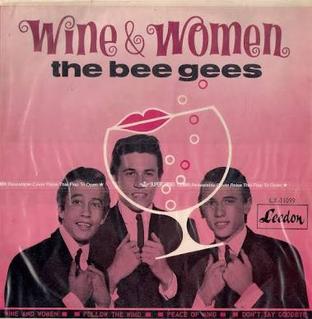
"Wine and Women" is a song written by Barry Gibb, and released by Barry Gibb and the Bee Gees in September 1965 on Leedon Records in Australia. The song's B-side was Follow the Wind. The single reached #19 in Australia, marking the Bee Gees' international chart debut. They achieved this by getting as many of their fans as possible to buy enough copies to get the song into the charts at #35 and, thus, to the attention of disc-jockeys.

"Let There Be Love" is a dramatic ballad by the Bee Gees, written by Barry, Robin and Maurice Gibb and released as the opening track on their 1968 album Idea. In 1970 it was issued as a single in the Netherlands, peaking at no. 14 in March during a four-week chart run. In 1968 the group performed (lip-synced) the song on a European TV station, and the clip has been played on 192TV in the Netherlands.
"The Singer Sang His Song" is a song written by Barry, Robin and Maurice Gibb and recorded by the English rock group Bee Gees, released in early 1968 as a single along with Jumbo. In some countries the song was the B-side of Jumbo but in others they were promoted as a double A-side.
"Bury Me Down By the River" is a song written by Barry and Maurice Gibb and recorded separately by the Bee Gees and P.P. Arnold. The Bee Gees' version was recorded in May 1969 at IBC Studios and released in April 1970 on the album Cucumber Castle.
"Kitty Can" is a song by the Bee Gees, composed by Barry, Robin & Maurice Gibb. It was released as the B-side of "I've Gotta Get a Message to You" in July 1968, and as the second track on the album Idea in September 1968. In 1973, RSO Records released a compilation called Kitty Can only in Argentina and Uruguay, and this song appeared as the first track on that album.
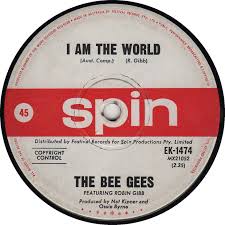
"I Am the World" is a song recorded by the Bee Gees, written and sung by Robin Gibb. It was released as the B-side of "Spicks and Specks". Later, it was included on the compilation Rare, Precious and Beautiful, Vol. 3 in 1969. It featured trumpet played by Geoff Grant. Its CD version was released in 1998 on the compilation Brilliant from Birth.
"Black Diamond" is a song by the Bee Gees released on the album Odessa in 1969. The song was written by Barry, Robin & Maurice Gibb and featured lead vocals by Robin Gibb. It was included on the compilation Marley Purt Drive released in 1970.

"Lamplight" is a song by the Bee Gees, released as the B-side of "First of May", but featured as the single's A-side in Germany. It also featured on their double album Odessa in March 1969. The song was written and composed by Barry, Robin & Maurice Gibb and featured lead vocals by Robin Gibb. No other singles were released from the album, and the fact that the group's manager Robert Stigwood chose "First of May", which only featured Barry Gibb's voice for the A-side, that caused Robin to quit the group.
"Kilburn Towers" is a folk song by the Bee Gees. Written by Barry, Robin and Maurice Gibb in 1968 for the album Idea. It was also released as the B-side of "I Started a Joke" in most territories. This song's length was 2:14 in mono and 2:17 in stereo. The song was produced by the group's manager Robert Stigwood and the Bee Gees. The song was written about the Sydney ocean apartment buildings, Kilburn Towers, built in 1960.












